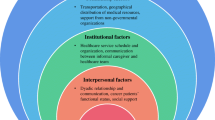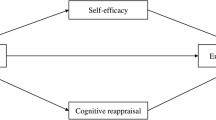Abstract
Cancer caregivers often experience significant challenges in their motivation and ability to comfort cancer survivors, particularly in a spousal or romantic context. Spousal cancer caregivers have been known to report even greater levels of burden and distress than cancer sufferers, yet still take on the role of acting as an informal caregiver so they can attend to their partner’s needs. The current study tested whether a theoretical model of supportive outcomes—the dual-process model of supportive communication—explained variations in cancer caregivers’ motivation and ability to create high-quality support messages. The study also tested whether participant engagement with reflective journaling on supportive acts was associated with increased motivation or ability to generate high-quality support messages. Based upon the dual-process model, we posited that, following supportive journaling tasks, caregivers of spouses currently managing a cancer experience would report greater motivation but also greater difficulty in generating high-quality support messages, while individuals caring for a patient in remission would report lower motivation but greater ability to create high-quality support messages. Findings provided support for these assertions and suggested that reflective journaling tasks might be a useful tool for improving remission caregivers’ ability to provide high-quality social support to survivors. Corresponding theoretical and applied implications are discussed.
Similar content being viewed by others
References
Albrecht TL, Adelman MB (1987) Communicating social support. Sage Publications, Newbury Park
Faw MH (2017) Supporting the supporter: social support and physiological stress among caregivers of children with disabilities. Adv Online Publ: J Soc Pers Relat. https://doi.org/10.1177/0265407516680500
High AC, Dillard JP (2012) A review of meta-analysis of person-centered messages and social support outcomes. Commun Stud 63:99–118. https://doi.org/10.1080/10510974.2011.598208
Bodie GD, Burlseon BR (2008) Explaining variations in the effects of support messages: a dual-process framework. Ann Int Commun Assoc 32:355–398. https://doi.org/10.1080/23808985.2008.11679082
Burleson BR (2010) Explaining recipient responses to supportive messages: development and tests of a dual-process theory. In: Smith SW, Wilson SR (eds) New directions in interpersonal communication research. Sage, Los Angeles, pp 159–179
Cutrona CE (1996) Social support in couples. Sage, Thousand Oaks
House JS, Landis KR, Umberson D (1988) Social relationships and health. Science 241(4865):540–545
Helgeson VS, Cohen S (1996) Social support and adjustment to cancer: reconciling descriptive, correlational, and intervention research. Health Psychol 15:135–148. https://doi.org/10.1037/0278-6133.15.2.135
Koopman C, Hermanson K, Diamond S, Angell K, Spiegel D (1998) Social support, life stress, pain and emotional adjustment to advanced breast cancer. Psycho-Oncology 7:101–111. https://doi.org/10.1002/(SICI)1099-1611(199803/04)7
Bloom JR, Stewart SL, Johnston M, Banks P, Fobair P (2001) Sources of support and the physical and mental well-being of young women with breast cancer. Soc Sci Med 53:1513–1524. https://doi.org/10.1016/S0277-9526(00)00440-8
Kroenke CH, Kubzansky LD, Schernhammer ES, Holmes MD, Kawachi I (2006) Social networks, social support, and survival after breast cancer diagnosis. J Clin Oncol 24:1105–1111. https://doi.org/10.1200/JCO.2005.04.2846
Wortman CB, & Lehman DR (1985) Reactions to victims of life crisis: support attempts that fail. In: Sarason IG & Sarason BR (Eds) Social support theory, research, and application. Dordrecht, Marinus Nijoff, p 463–489
Arora NK, Rutten LJF, Gustafson RM, Hawkins RP (2006) Perceived helpfulness and impact of social support provided by family, friends, and health care providers to women newly diagnosed with breast cancer. Psycho-Oncology 16:474–486. https://doi.org/10.1002/pon.1084
Samter W (2002) How gender and cognitive complexity influence the provision of emotional support: a study of indirect effects. Commun Rep 15:5–16
Goldsmith DJ (1992) Managing conflicting goals in supportive interactions: an integrative theoretical framework. Commun Res 19:264–286
Lu L (1997) Social support, reciprocity, and well-being. J Soc Psychol 137:618–628
Wortman CB, Dunkel-Schetter C (1979) Interpersonal relationships and cancer. J Soc Issues 35:120–155
Pasquini MC, Zhu X (2015) Current uses and outcomes of hematopoietic stem cell transplantation: CIBMTR summary slides. Retrieved from: http://www.cibmtr.org
Rini C, Redd WH, Austin J, Mosher CE, Meschian YM, Isola L et al (2011) Effectiveness of partner social support predicts enduring psychological distress after hematopoietic stem cell transplantation. J Consult Clin Psychol 79:64–74. https://doi.org/10.1027/a0022199
Bevans MF, Mitchell SA, Marden S (2008) The symptom experience in the first 100 days following allogeneic hematopoietic stem cell transplantation (HSCT). Support Care Cancer 16:1243–1254. https://doi.org/10.1007/s00520-008-0420-6
Mosher CE, DuHamel KN, Rini C, Corner G, Lam J, Redd WH (2011) Quality of life concerns and depression among hematopoietic stem cell transplant survivors. Support Care Cancer 19:1357–1365. https://doi.org/10.1007/s00520-010-0958-y
Teschendorf B, Schwartz C, Ferrans CE, O’Mara A, Novotny P, Sloan J (2007) Caregiver role stress: when families become providers. Cancer Cult Lit 14:183–189
Litzelman K, Green PA, & Yabroff KR (2016) Cancer and quality of life in spousal dyads: spillover in couples with and without cancer-related health problems. Support Care Cancer 24:763–771
Bodie GD (2013) The role of thinking in the comforting process: an empirical test of a dual-process framework. Commun Res 40(4):533–558. https://doi.org/10.1177/0093650211427030
Bodie GD, MacGeorge EL (2015) Supportive communication theories. In: Braithwaite DO, Schrodt P (eds) Engaging theories in interpersonal communication. Sage, Thousand Oaks, pp 129–141
Burleson BR (1982) The development of comforting communication skills in childhood and adolescents. Child Dev 53:1578–1588
Bodie GD, Burleson BR, Holmstrom AJ, McCullough JD, Rack JJ, Hanasono LK et al (2011) Effects of cognitive complexity and emotional upset on processing supportive messages: two tests of a dual-process theory of supportive communication outcomes. Hum Commun Res 37:350–376
Mackenzie CS, Smith MC, Hasher L, Leach L, Behl P (2007) Cognitive functioning under stress; evidence from informal caregivers of palliative patients. J Palliat Med 10:749–758. https://doi.org/10.1089/jpm.2006.0171
Nijboer C, Triemstra M, Tempelaar R, Sanderman R, & van den Bos GA (1999) Determinants of caregiving experiences and mental health of partners of cancer patients. Cancer 86:577–588
Caplan SE, Haslett BJ, Burleson BR (2005) Telling it like it is: the adaptive function of narratives in coping with loss in later life. Health Commun 17:233–251
Slotter EB, Ward DE (2015) Finding the silver lining: the relative roles of redemptive narratives and cognitive reappraisal in individuals’ emotional distress after the end of a romantic relationship. J Soc Pers Relat 32(6):737–756. https://doi.org/10.1177/0265407514546978
Fritson KK (2008) Impact of journaling on students’ self-efficacy and locus of control. InSight: J Scholarly Teach 3:75–83
Harvey-Knowles JA (2017) Verbal person-centered support provision quality following an exploratory supportive skills intervention. Adv Online Publ: West J Commun. https://doi.org/10.1080/10570314.2017.1308004
Ryan RM (1982) Control and information in the intrapersonal sphere: an extension of cognitive evaluation theory. J Pers Soc Psychol 43:450–461
McAuley E, Duncan T, & Tammen VV (1987) Psychometric properties of the intrinsic motivation inventory in a competitive sport setting: a confirmatory factor analysis. Res Q Exerc Sport 60:48–58
Zarit SH, Reever KE, & Bach-Peterson J (1980) Relatives of the impaired elderly: correlates of feelings of burden. Gerontologist 20:649–655
Burleson BR (2003) Emotional support skill. In: Greene JO, Burleson BR (eds) Handbook of communication and social interaction skills. Lawrence Erlbaum, Mahwah, pp 551–594
Burleson BR (1984) Comforting communication. In: Sypher H & Applegate J (Eds) Communication by children and adults. Thousand Oaks, Sage Publications
Seltman HJ (2015) Experimental design and analysis. Retrieved from http://www.stat.cmu.edu/~hseltman/309/Book/Book.pdf
Sullivan KT, Davila J (2010). Support processes in intimate relationships (Eds.) Oxford University Press: New York
Lazarus RS (1966) Psychological stress and the coping process. McGraw-Hill, New York
Bevans MF, Sternberg EM (2012) Caregiving burden, stress, and health effects among family caregivers of adult cancer patients. JAMA 307:398–403
Kim Y, Spillers RL, Hall DL (2012) Quality of life of family caregivers 5 years after a relative’s cancer diagnosis: follow up of the national quality of life survey for caregivers. Psycho-Oncology 21:273–281
Author information
Authors and Affiliations
Corresponding author
Ethics declarations
Conflict of interest
The authors declare that they have no conflict of interest.
Rights and permissions
About this article
Cite this article
Harvey-Knowles, J., Faw, M.H. Caregiver social support quality when interacting with cancer survivors: advancing the dual-process model of supportive communication. Support Care Cancer 26, 1281–1288 (2018). https://doi.org/10.1007/s00520-017-3951-x
Received:
Accepted:
Published:
Issue Date:
DOI: https://doi.org/10.1007/s00520-017-3951-x




